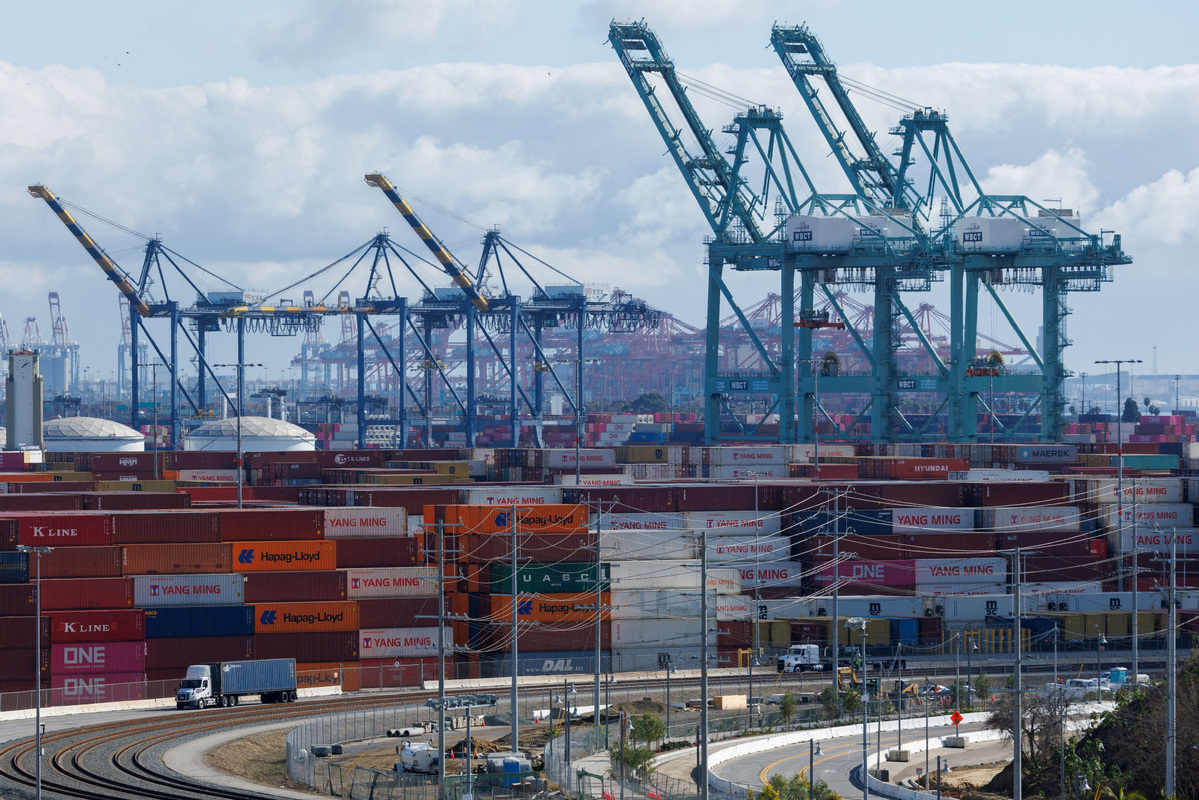
The world is closely watching the unfolding trade war initiated by the United States, with the turbulent China-US trade talks taking center stage as the first meeting of the China-US economic and trade consultation mechanism opened in London on Monday.
US President Donald Trump has doubled down on his tariff policy in his second term in office, but he should realize that the global geopolitical and economic situation has shifted dramatically in the past half a decade to the disadvantage of the US. Although Trump projects the trade war as a show of strength that benefits the US economy, facts indicate the trade war is a recipe for disaster.
READ MORE: China, US reach framework on trade
Here's why: As the US alienates its trading partners, including some of its long-standing allies, China is filling the vacuum by widening its diplomacy and insulating its economy from outside shocks. China is negotiating or pursuing trade deals with Japan, the Republic of Korea, ASEAN member states, and even Greenland, burnishing its image as a pillar of global stability as the US marches toward isolation.
Decades of diversification, most notably through the Belt and Road Initiative, have made China far less reliant on the US market than it was even a decade ago: ASEAN is now China's largest trading partner, and China's economic ties with the European Union, and African and Middle East countries are expanding. As a result, when faced with revived US tariffs, China responded with a strong but restrained warning, demanding that any further negotiations be based on "mutual respect", a move that reflects its growing diplomatic bargaining power and ability to resist economic coercion.
Collectivist Chinese principles favor a strong response to Washington. The trade war the US has renewed is not just considered an economic clash, but a challenge to China's national pride.
Besides, Trump's escalated tariffs face growing resistance from US businesses, citizens and courts. The US president's authority to impose sweeping tariffs on imports from Washington's trading partners has been challenged in courts, with a US trade court ruling that Trump has overstepped the constitutional redlines and asserting that the power to regulate foreign trade lies with the Congress, not the president. Despite a US federal appeals court temporarily reinstating the tariffs, their long-term legal stability remains in doubt. These legal cracks mirror the confusion and skepticism surrounding the US president's trade agenda.
Worse, the US' traditional allies are breaking ranks. Canada, the EU, and some major Asian economies have opposed the new US tariffs. The EU, preparing for another round of negotiations, has warned the US that it will fast-track retaliatory actions if Washington imposes 50 percent tariffs on its steel and aluminum exports — up from the original 25 percent. The European Commission has called the move damaging for diplomacy, with commission spokesperson Miriam García Ferrer saying countermeasures could be taken as early as July 14.
Canadian Prime Minister Mark Carney, too, has condemned the US' move, saying the tariffs are "unjustified and unlawful" and announced his government would introduce legislation to fast-track major national infrastructure and industrial projects to shield the Canadian economy from the fallout.
More important, the US' economic weaknesses are becoming more visible. Manufacturing has dwindled to just 10 percent of GDP, while consumption accounts for nearly 70 percent of economic activity. And with imports rising, the trade gap remains wide. In fact, Morgan Stanley projects a 9 percent drop in the US dollar, citing a slowing economy and expected interest rate cuts.
ALSO READ: Rare earth policy key to sustainability
Pressure is also growing at the business level. While CEOs anticipate cost hikes, Walmart chief Doug McMillon has stressed that consumers will have to pay higher prices because of the tariffs. Lawsuits by trade groups, led under the International Emergency Economic Powers Act, have challenged the legality and viability of the US leader's strategy, and recession fears are mounting-JPMorgan puts the odds at 60 percent, with BlackRock's Larry Fink suggesting a contraction may already be underway.
Moreover, a majority of Americans now view Trump's foreign trade policy as inconsistent and unclear, and the US trade policy uncertainty index has risen significantly compared with last year.
Without a credible strategy, the US president's trade war risks undermining the US' economic stability, alienating US allies, and handing strategic advantage to Beijing. As Wharton's Jeremy Siegel said, these tariffs may be "the biggest policy mistake in 95 years".
The author is a lecturer at Vietnam National University in Ho Chi Minh City.
The views don't necessarily reflect those of China Daily.


